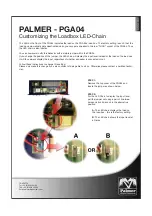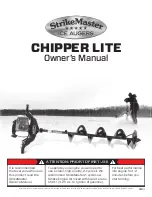
4
Solo in corrispondenza dei triangoli si devono disporre le funi o le
benne del dispositivo di sollevamento ed applicare la forza di
sollevamento.
All'atto della consegna dell'apparecchio, prima di controfirmare i
documenti di spedizione, in presenza del trasportatore, verificare
accuratamente l'integrità dell'imballaggio. Rilevando danneggiamenti
all'imballo, procedere alla verifica minuziosa dell'apparecchio.
Tagliare i nastri di chiusura (reggetta), liberare l'apparecchio dal
cartone d'imballaggio ed asportare la pellicola protettiva.
Verbalizzare l'entità del danno facendola sottoscrivere al vettore,
pena il mancato risarcimento dei danni subiti. Depositare
l'apparecchio su tasselli distanziatori disposti negli angoli della base
della struttura, per distanziarlo da terra per il successivo
sollevamento mediante un elevatore munito di forche o benne di
adeguata lunghezza, per disporlo in posizione operativa, sia sul
piano di appoggio, che sull'eventuale incastellatura metallica di
supporto. All'interno del forno, asportare le tavolette poste a
protezione delle mattonelle refrattarie, durante il trasporto.
Provvedere alla regolare eliminazione del materiale di scarto, quale
l'imballaggio, riponendolo negli appositi cassonetti, evitando ogni
possibile inquinamento ambientale.
Anche gli eventuali residui della produzione dell'apparecchio
dovranno essere depositati nei cassonetti per la raccolta dei rifiuti,
evitando
ogni
forma
di
inquinamento
correlata
all'uso
dell'apparecchio stesso. L'apparecchio è pressochè completo e
richiede solamente l'installazione del bocchettone di scarico dei fumi
ed il collegamento alla rete elettrica di alimentazione, che deve
avere le caratteristiche corrispondenti a quelle dell'apparecchiatura.
Tutti gli apparecchi devono essere collegati al conduttore di
protezione PE.
Il collegamento
deve essere
eseguito esclusivamente
da
un'installatore civile specializzato ed esperto, il quale dovrà eseguire
gli opportuni collegamenti e l'installazione, adottando materiali
certificati dagli Enti di sicurezza, ed eseguire l'intervento a regola
d'arte, rilasciando infine la prevista dichiarazione dell'intervento
eseguito, da conservare per almeno dieci anni. L'apparecchio deve
appoggiare su una superficie ampia quanto la base; solida, ben
livellata e piana.
Tutt'intorno richiede uno spazio minimo non inferiore a 50 cm per
consentirne l'opportuna ventilazione, l'accesso per la pulizia e
l'eventuale manutenzione.
Disporre l'apparecchio in posizione protetta rispetto a fonti di umidità
o rubinetti di erogazione dell'acqua i cui spruzzi potrebbero
raggiungere l'apparecchio. Il luogo di installazione deve essere
efficacemente illuminato e sufficientemente ampio per lasciare
all'operatore lo spazio di passaggio tutt'intorno o almeno su due lati.
Se l'apparecchio viene installato su di un supporto avente struttura
metallica, questa deve essere priva di ruote, per escludere il grave
pericolo dello strappo del cavo, nel caso di spostamenti inconsulti,
oltre ad altri possibili danni.
2 ASSEMBLAGGIO DEGLI ELEMENTI DEL SUPPORTO PER
FORNO
Con riferimento agli elementi illustrati in figura, procedere nel modo
seguente: Dopo l'apertura degli imballi e la verifica del contenuto,
predisporre gli elementi suddividendoli come nella figura 2.
The cables or the hoisting machine’s buckets must be placed, and
force must be applied, only in the positions indicated by the
triangles.
When the unit is delivered, in the shipper’s presence carefully check
that there is no damage to the packing before signing the shipping
documents.
If the packing is found to be damaged, very carefully verify that the
unit is undamaged.
Cut the strap used to close the box, remove the unit from the
cardboard box used for packing, and remove the protective film from
it.
Put the extent of the damage into writing and have the carrier sign it;
if this is not done, you will not receive any compensation for the
damage. Place the unit on the spacer blocks found in the corners of
the structure’s base. This is done to keep it raised off the ground so
that it can be hoisted by means of a forklift truck’s forks or buckets
which must be of a suitable length. In this manner place it in its
operating position, either on a support surface or on a metal support
frame. Remove the boards located inside the oven for protecting the
refractory tiles during shipping.
Correctly dispose of any refuse, such as the packing materials, by
placing them in the proper waste bins so as to avoid any
environmental pollution.
Any residues resulting from the manufacture of the unit must also be
placed in the waste bins so as to avoid any pollution connected with
the use of the unit. The unit is almost completely assembled and
requires only exhaust flue installation and connection to the power
supply, which must correspond to the unit’s specifications.
All the units must be connected to the PE protection wire.
The connections must be performed only by a specialized expert
civil installer who will install the unit and make all necessary
connections using materials that are certified by the safety
authorities; he must carry this out in a professional manner and is
also required to issue a statement on the work that was performed,
which must be kept for at least ten years. The unit must be placed
on a solid, flat, and very level surface as large as the base.
There must be at least 50 cm of space around the unit to permit
proper ventilation and to allow access for cleaning and any
necessary maintenance.
Place the unit in a position that is protected from sources of moisture
or water taps to prevent spray from reaching it. The installation area
must be well-lighted and sufficiently large to allow the operator
enough space around the unit or at least on two sides. If the unit is
installed on a support with a metal structure, this support must not
have wheels so as to prevent the serious danger of the power cable
being parted, as well as other possible damage, if the unit is moved
imprudently.
2 ASSEMBLING THE SUPPORT PARTS FOR OVENS.
Refer to the parts shown in the figure and proceed in the following
manner: after you have opened the boxes and verified their
contents, divide the parts as shown in figure 2.
1 2 3 4
5
6
7
8
9
A - Viti + dadi di fissaggio
B - Viti di livellamento Supporto
C - Viti + Dadi di ancoraggio forno al supporto
Figura 2
Abb. 2
Figure 2



































